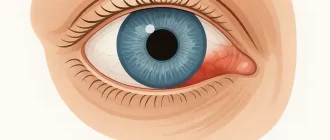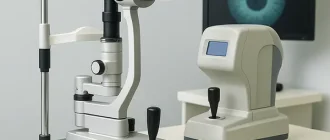Dehydration doesn’t just make you thirsty; it impacts nearly every part of your body, including your eyes. When you’re dehydrated, your body prioritizes vital organs like your heart and brain, leaving less water available for other functions. This lack of hydration can directly affect your eyes, which rely on sufficient fluid to maintain proper function.
Hydration and Tear Production
Can dehydration cause dry eyes?
Yes, dehydration is a leading cause of dry eyes. The tear film that keeps your eyes moist and protected is made of three layers: water, oil, and mucus. Without enough water, this film becomes unstable, leading to symptoms like irritation, redness, and a gritty sensation.
A study from the American Academy of Ophthalmology notes that mild dehydration can reduce tear production, increasing discomfort and potentially worsening pre-existing conditions like blepharitis or contact lens intolerance.
Screen Time vs. Hydration Habits
| Screen Time (Hours) | Recommended Water Intake (Liters / oz) |
|---|---|
| Less than 2 | 1.5 L / 50.7 oz |
| 2 to 4 | 2.5 L / 84.5 oz |
| 4 to 6 | 3.5 L / 118.3 oz |
| More than 6 | 4 L / 135.3 oz |
Does dehydration affect your vision clarity?
Absolutely. Dehydration can blur your vision. Tears play a critical role in ensuring light refracts correctly as it passes through your eyes. When your tear film becomes irregular due to dehydration, it can scatter light unevenly, resulting in blurred or distorted vision. This effect can be especially pronounced if you already suffer from refractive errors like astigmatism.
Are headaches and eye strain related to dehydration?
Dehydration is a common culprit behind headaches, and eye strain can exacerbate these symptoms. When you’re dehydrated, your body produces less cerebrospinal fluid, which cushions your brain. This can lead to headaches that are often accompanied by eye strain. A classic scenario? Spending hours in front of a screen without proper hydration—a surefire recipe for discomfort.
How does dehydration worsen existing eye conditions?
If you have pre-existing eye conditions such as glaucoma or diabetic retinopathy, dehydration can make them worse. For example:
- Glaucoma: Dehydration may elevate intraocular pressure (IOP), potentially increasing the risk of optic nerve damage.
- Diabetic Retinopathy: Proper hydration helps regulate blood sugar levels, and dehydration can contribute to blood viscosity, increasing complications.
Can dehydration mimic more serious eye problems?
Yes, symptoms of dehydration—like redness, irritation, or vision changes—can sometimes mimic more severe conditions such as conjunctivitis or keratoconjunctivitis sicca. If symptoms persist after rehydrating, consult an eye care professional to rule out underlying issues.
What are some real-life cases?
In Dallas, a 35-year-old IT professional developed severe dry eyes and blurred vision after spending hours working in an air-conditioned office while neglecting water intake. After consulting with an ophthalmologist, he was advised to hydrate frequently, use artificial tears, and take regular screen breaks. His symptoms improved dramatically within a week.
Similarly, a Las Vegas marathon runner experienced temporary vision loss due to dehydration during a summer race. Immediate rehydration and rest restored her vision without permanent damage.
How much water should you drink for eye health?
The general recommendation for daily water intake is about 3.7 liters for men and 2.7 liters for women, including fluids from food. To specifically benefit your eyes:
- Drink water throughout the day, not all at once.
- Pair hydration with a balanced diet rich in omega-3 fatty acids, which support tear production.
A “Did You Know?” Fact
Did you know that your tears consist of about 98% water? Without enough water, your tear ducts can’t produce adequate tears, leading to dry eyes and discomfort. [Source: National Eye Institute]
How to prevent dehydration-related vision problems
Preventing dehydration is simple with these strategies:
- Stay ahead of thirst: Keep a reusable water bottle with you and set reminders to take small sips throughout the day. Apps like WaterMinder or simple alarms on your phone can help.
- Limit caffeine: Instead of that extra coffee, opt for herbal teas or infused water with lemon and cucumber, which add a refreshing twist without dehydrating effects.
- Use a humidifier: Place a small, portable humidifier in your bedroom or office. Many models today include smart features to adjust moisture levels automatically.
- Opt for eye-friendly supplements: Incorporate foods rich in omega-3s like salmon, flaxseeds, or walnuts into your meals. For a convenient option, try omega-3 capsules or fortified beverages.
- Plan hydration breaks: If you work long hours, make it a habit to take a five-minute hydration break every hour. Use this time to stretch and rest your eyes, reducing strain.
Editorial Advice
Don’t underestimate the impact of hydration on your vision. While staying hydrated is essential for overall health, its importance for eye health is often overlooked. Make a habit of drinking water consistently throughout the day, and if you experience persistent eye discomfort, consult an eye care professional. Your eyes—and your entire body—will thank you.
Dehydration Severity and Vision Clarity
| Dehydration Level | Vision Clarity (%) |
|---|---|
| Mild Dehydration | 90% |
| Moderate Dehydration | 60% |
| Severe Dehydration | 30% |






